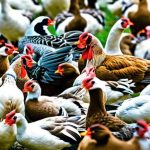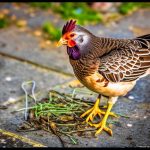Winter can significantly impact chicken egg production due to cold temperatures and reduced daylight hours. Chickens are sensitive to environmental changes, and winter presents various challenges for them. Cold weather can stress the birds, leading to decreased egg production.
Additionally, chickens typically require 14-16 hours of light daily for consistent egg laying, which is often not available during shorter winter days. The cold temperatures can also affect egg quality during winter. Chickens may produce smaller eggs with thinner shells, making them more prone to cracking and damage.
This occurs because chickens need to allocate more energy to staying warm, leaving less energy for egg production. Understanding these factors is crucial for chicken owners to effectively manage their flock during winter months. By recognizing the impact of winter on chicken laying, owners can make informed decisions about nutrition, environment, and care to ensure their chickens remain healthy and productive throughout the season.
Proactive measures can help mitigate the challenges posed by winter conditions and support consistent egg production.
Table of Contents
- 1 Providing the right nutrition for winter egg production
- 2 Creating a warm and comfortable environment for your chickens
- 3 Managing light exposure to stimulate egg production
- 4 Ensuring access to fresh water at all times
- 5 Monitoring the health of your chickens during the winter months
- 6 Implementing a consistent and routine care schedule for your chickens
- 7 FAQs
- 7.1 What factors can affect a chicken’s egg production in the winter?
- 7.2 How can I keep my chickens laying eggs in the winter?
- 7.3 What should I feed my chickens to encourage egg production in the winter?
- 7.4 How can I provide supplemental lighting for my chickens in the winter?
- 7.5 Are there any health concerns I should be aware of when keeping chickens laying in the winter?
Key Takeaways
- Winter can have a significant impact on chicken laying, leading to decreased egg production.
- Providing the right nutrition, including a balanced diet and additional supplements, can help support egg production during the winter months.
- Creating a warm and comfortable environment for chickens, such as using heaters and insulation, can help maintain egg production.
- Managing light exposure by using artificial lighting can stimulate egg production during the shorter days of winter.
- Ensuring access to fresh water at all times is crucial for maintaining the health and egg production of chickens during winter.
Providing the right nutrition for winter egg production
Protein for Egg Production
Protein is particularly important for egg production, as it provides the building blocks for egg formation. Including sources of protein such as soybean meal, fish meal, or mealworms in their diet can help support their egg-laying capabilities.
Calcium for Strong Eggshells
In addition to protein, chickens also require a sufficient intake of calcium to support the production of strong eggshells. Providing access to oyster shells or crushed eggshells can help ensure that chickens have an adequate source of calcium to support their egg production during winter.
Calorie Intake and Energy Needs
It’s also important to monitor their overall calorie intake, as chickens may require more calories to maintain their body temperature in the cold weather. Supplementing their diet with grains such as corn or wheat can help provide the necessary energy for them to stay warm and continue laying eggs.
By providing the right nutrition for winter egg production, chicken owners can help support their flock’s overall health and productivity during the challenging winter months.
Creating a warm and comfortable environment for your chickens

Creating a warm and comfortable environment for chickens is essential for supporting their well-being and egg production during the winter months. Cold temperatures can be particularly challenging for chickens, as they are more susceptible to frostbite and other cold-related health issues. To ensure their comfort and safety, it’s important to provide adequate insulation in their coop to help retain heat.
This can be achieved by adding extra bedding, insulating walls, and sealing any drafts that may let cold air in. Additionally, providing a heat source such as a heat lamp or heated perch can help maintain a comfortable temperature inside the coop. It’s also important to ensure that the coop is well-ventilated to prevent moisture buildup, which can lead to respiratory issues for the chickens.
Proper ventilation will help maintain air quality and prevent the buildup of ammonia from their droppings. In addition to the coop, it’s important to provide a dry and secure outdoor area for the chickens to roam and exercise. This will help prevent boredom and encourage natural behaviors, which can contribute to their overall well-being and egg production.
By creating a warm and comfortable environment for your chickens, you can help mitigate the challenges of winter and support their health and productivity throughout the season.
Managing light exposure to stimulate egg production
Managing light exposure is crucial for stimulating egg production during the winter months when daylight hours are reduced. Chickens rely on light cues to regulate their reproductive hormones and maintain consistent egg-laying patterns. To support their natural cycle, it’s important to provide supplemental lighting in the coop to extend their “daylight” hours.
This can be achieved by installing artificial lights on a timer to ensure that chickens receive around 14-16 hours of light per day, which is necessary for optimal egg production. It’s important to gradually increase the amount of light provided in the morning and evening to mimic natural sunrise and sunset patterns. This will help prevent sudden changes in light exposure, which can stress the chickens and disrupt their laying patterns.
Additionally, it’s important to provide a period of darkness at night to allow the chickens to rest and recharge. Managing light exposure in this way can help stimulate egg production and support consistent laying throughout the winter months. By implementing a thoughtful lighting schedule, chicken owners can help mitigate the impact of reduced daylight hours on their flock’s productivity.
Ensuring access to fresh water at all times
Ensuring access to fresh water is essential for supporting chicken health and egg production during the winter months. Cold temperatures can cause water sources to freeze, making it difficult for chickens to stay hydrated. Dehydration can lead to a variety of health issues, including reduced egg production and increased susceptibility to cold-related illnesses.
To prevent water from freezing, it’s important to provide heated waterers or regularly check and replace frozen water throughout the day. In addition to preventing freezing, it’s important to ensure that water is kept clean and free from contaminants that can negatively impact chicken health. Regularly cleaning waterers and providing fresh water daily will help ensure that chickens have access to clean and safe drinking water.
It’s also important to monitor water intake during winter, as chickens may require more water than usual to stay hydrated in the cold weather. By ensuring access to fresh water at all times, chicken owners can help support their flock’s overall health and productivity throughout the winter months.
Monitoring the health of your chickens during the winter months








